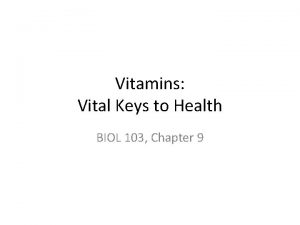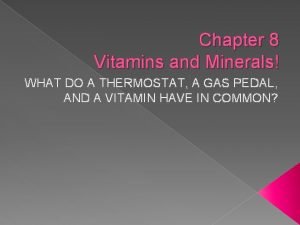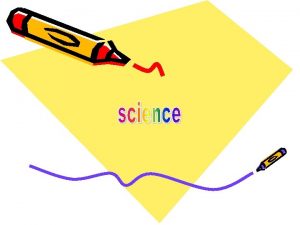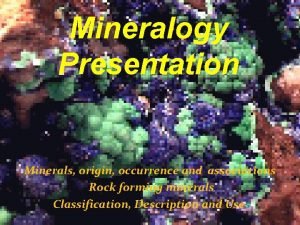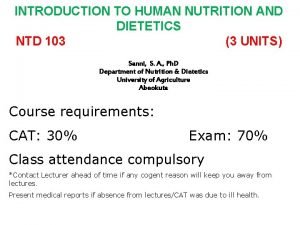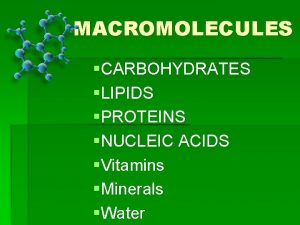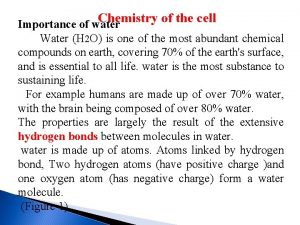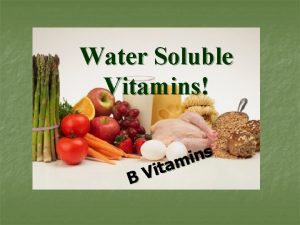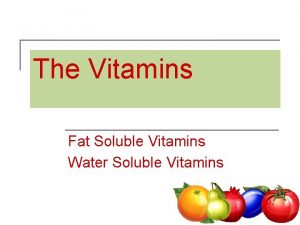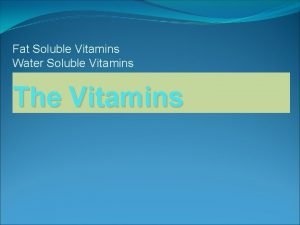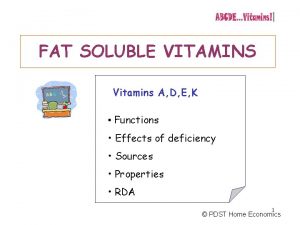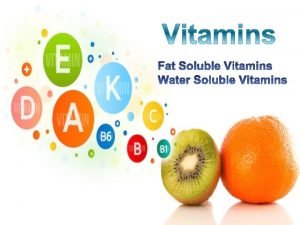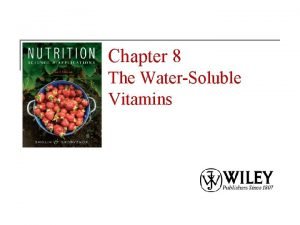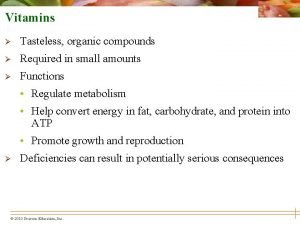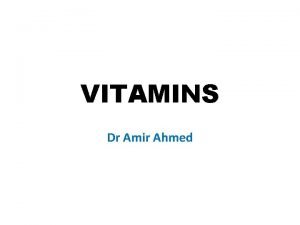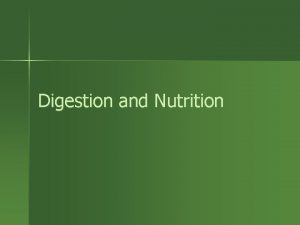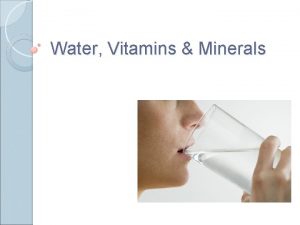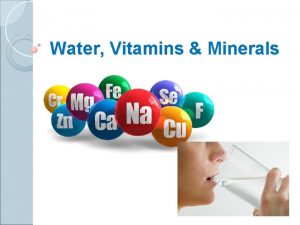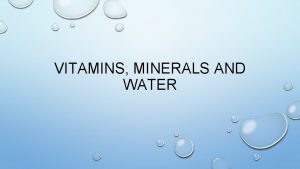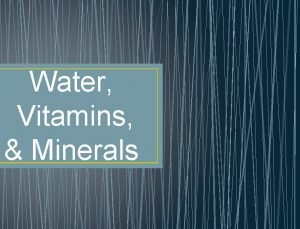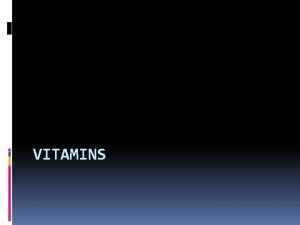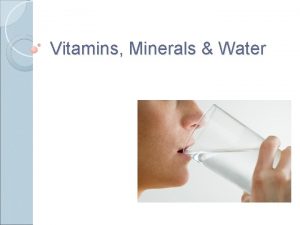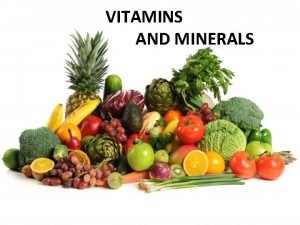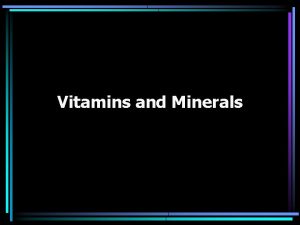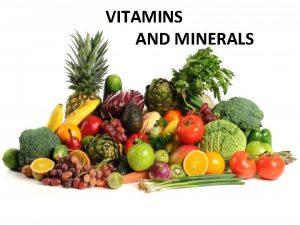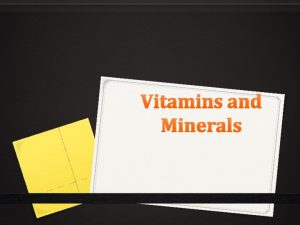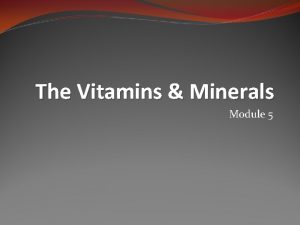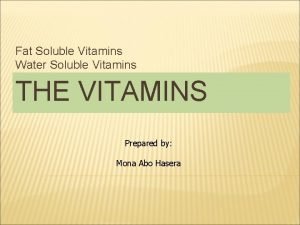Vitamins Minerals Water Myth As part of a















- Slides: 15

Vitamins, Minerals, & Water Myth: As part of a healthy diet, people need to take dietary supplements

FACT l A diet that contains a variety of healthful foods usually supplies all the vitamins and minerals that your body needs

Vitamins l Vitamins: nutrients that are made by living things, are required in small amounts, and that assist many chemical reactions l Vitamins help the body with various processes, including the use of other nutrients

Two Classes of Vitamins Fat-soluble vitamins Water-soluble vitamins l Dissolve in fatty materials l Examples: vitamin A, D, E, & K l Found in foods such as, vegetable oils, liver, eggs, & vegetables l Can be stored in the body l Dissolve in water l Examples: vitamin C & all of the B vitamins l Found in fruits, vegetables, & other sources l Cannot be stored by the body. You need to eat them everyday.

Fat-Soluble Vitamins Good Sources Main Functions A Liver; eggs; cheese, milk; yellow, orange, and dark green vegetables & fruit Maintains healthy skin, bones, teeth, & hair. Aids in vision in dim light D Milk; eggs; liver; exposure of skin to sunlight Maintains bones and teeth; helps in the use of calcium and phosphorus E Margarine; vegetable oils; wheat germ; whole grains; legumes; green vegetables Aids in maintenance of red blood cells, vitamin A, and fats K Green, leafy vegetables; potatoes; liver Aids in blood clotting

Water-Soluble Vitamins Vitamin Good Sources Main Functions B 1 (Thiamin) Port products; liver, whole grain; legumes Aids in carbohydrate use and nervous system function B 2 ( Riboflavin) Milk; eggs; meat; whole grains; dark green vegs. Aids in metabolism of carbs, proteins, fats B 3 ( Niacin) Poultry; meat; fish; nuts Aids in metabolism B 6 (Pyridoxine) Meat; fish; poultry; fish; whole grain; vegetables Aids in metabolism of carbs, proteins, & fats B 12 (Cobalamin) Meat; fish; poultry; eggs; grains Maintains healthy nervous system and red blood cells Pantothenic acid Organ meats; poultry; fish; eggs; grains Aids in metabolism C ( Ascorbic acid) Citrus fruits; green vegetables; melons; Aids in bone, teeth, & sin formation; resistance to

Antioxidants l Some vitamins are called antioxidants, they help protect healthy cells from the damage caused by the normal aging process as well as from certain types of cancer l Examples: vitamin C & E l Found in citrus fruits, strawberries, broccoli, tomatoes, potatoes (vitamin C) l Found in vegetable oils, whole grains, seeds, nuts, & peanut butter

Minerals l Minerals: nutrients that occur naturally in rocks and soils, your body requires only small amounts l There are 24 different minerals that have been shown to be essential for good health l You need 7 minerals in significant amounts, & trace amounts of others

Minerals 7 significant minerals Other minerals l l l Calcium Sodium Potassium Magnesium Phosphorus Chlorine sulfur Iron Fluorine Iodine Copper zinc

Minerals Calcium Sodium l Helps in blood clotting & functions of the nervous system l Essential formation & maintenance of bones and teeth l Lack of calcium can lead to osteoporosis l Also known as salt l Aids in heart function & water balance

Minerals iron Potassium l Necessary for healthy red blood cells l Not enough iron can lead to anemia, which may cause people to be weak or tired l Maintains water balance l Helps reduce blood pressure

Minerals Mineral Good Sources Main Functions Calcium Milk, dark greens, vegetables, tofu; legumes Helps build & maintain bones and teeth; nerve and muscle function; blood clotting Phosphorus Meat; eggs; poultry; fish; legumes; milk Helps build & maintain bones and teeth; energy metabolism Magnesium Leafy green vegetables; Helps build bones and legumes; nuts; whole-grain protein; energy food metabolism; muscle contraction Sodium Table salt; processed food; Helps maintain water soy sauce balance; nerve function Chlorine Table salt; processed food; Helps maintain water soy sauce balance; digestion Potassium Vegetables; fruits; meat; poultry; fish Helps maintain water balance & make protein; functions of heart and

Minerals Mineral Good sources Main functions Sulfur Milk, meat; poultry; fish; legumes; nuts Forms part of some amino acids and B vitamins Iodine Seafood; iodized salt Helps in metabolism as part of thyroid hormone Selenium Seafoods; meats; organ meats Helps break down harmful substances Iron Red meats; seafood; legumes; vegetables; dried fruits Part of red blood cells; helps in energy metabolism Zinc Meats; poultry; seafood; milk; whole-grain foods Part of many substances that help carry out body processes Fluorine Fish; fluoridated water Helps form strong teeth and bones

Water l 65 % of your body weight is water l Nearly all of the body’s chemical reactions, including those that produce energy and bulild new tissues, take place in a water solution

Water & Homeostasis l Homeostasis: the process of maintaining a steady state inside your body l Water regulates body temperature l Water contains electrolytes which regulate many processes in your cells
 Water soluble vitamins vs fat soluble vitamins
Water soluble vitamins vs fat soluble vitamins Chapter 8 vitamins and minerals
Chapter 8 vitamins and minerals Dairy produts
Dairy produts Importance of mineralogy
Importance of mineralogy Vitamin flowchart
Vitamin flowchart Are vitamins and minerals macromolecules
Are vitamins and minerals macromolecules Water and water and water water
Water and water and water water Water soluble vitamins characteristics
Water soluble vitamins characteristics Manaquinone
Manaquinone Water-soluble vitamins
Water-soluble vitamins Adek vitamins water soluble
Adek vitamins water soluble Water soluble vitamins characteristics
Water soluble vitamins characteristics Vitamin absorption
Vitamin absorption How are vitamins absorbed
How are vitamins absorbed Keratomalacia
Keratomalacia Digestion refers to
Digestion refers to
